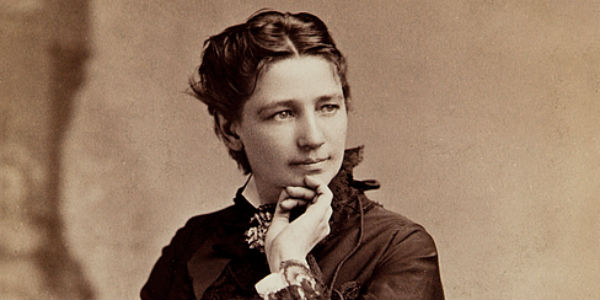Why defend democracy? Because the job of pursuing justice belongs to everybody
When we think about how to vote, writes Jeffrey Howard (University College London), we have a duty to try to achieve justice for everybody – not just ourselves.

Victoria Woodhull, the first woman to run for US president. Photo: Public domain
“If Congress refuse to listen to and grant what women ask, there is but one course left then to pursue. What is there left for women to do but to become the mothers of the future government?”
— Victoria Woodhull (1838-1927), first female candidate for U.S. president and women’s suffrage campaigner
It is taken for granted by nearly everyone in the democratic world that democracy is a good thing. So widespread is this assumption that there is scarcely any discussion in the general public about why, exactly, it is a good thing. What, in other words, makes democracy worth fighting for?
There are, no doubt, many reasons to celebrate democracy as a form of government worth wanting. Among its clearest advantages are its consequences, at least in contrast to other forms of politics. Democracies tend to lead to better outcomes than other regimes. It is commonplace in modern political science to see democracies as prone to producing less famine, less war, less poverty, and less oppression. This doesn’t mean that democracies never make mistakes – far from it. But they make them less than other regimes do.
Democracy’s instrumental benefits surely explain, in part, the struggle to extend voting rights to women and other historically disenfranchised groups. After all, the benefits of democratic government flow chiefly to those constituents to whom the government is accountable. Societies that have extended to franchise to some, but not all, adult residents, have typically subjected excluded citizens to heinously unjust treatment. So much is obvious.
It is tempting, then, to think of the courageous heroes who risked so much to secure voting rights as simply concerned with their own interests. That is no insult: people have a moral right to institutions that reliably protect their basic interests, and they are not acting greedily by insisting on such institutions. Still, I think that there is more to the story.
In a recent academic article, entitled “The Labors of Justice,” I defend the idea that the value of democracy is not simply that it leads to better consequences (e.g., by providing a mechanism through which people can advocate for their own interests). I argue that we should value democracy because it expresses a crucial moral truth: we are all accountable to one another.
Specifically, members of a society have a moral duty to work to protect each other’s fundamental rights. This duty is sometimes called “the natural duty of justice”, which, roughly, is a moral requirement shared by all human beings to support and defend the achievement of justice wherever they live (and possibly beyond, too). The idea here is that morality already tasks us, as equals, with the job of running a society that protects everyone’s basic rights. My suggestion is that democracy is a way of operationalising that basic insight. The labours of justice are ones belonging to us all.
When Victora Woodhull, one of the great feminist campaigners of American history, spoke of “the mothers of the future government,” she captured this insight. When people fight for the right to vote, they are not simply fighting for their own self-interest. They are fighting for the job of citizenship. To shut people out of the franchise is to suggest, insultingly, that the great political challenges of the nation are not for them to decide. This sends a disrespectful message of inferiority, expressing to those excluded that they are not part of the community of duty-bearing moral agents.
What are the implications of this view for how we should run our democracies? First, it suggests that when we reason about what laws to support, and which candidates to vote for, our central concern must be the achievement of justice. This is not a particularly controversial idea in academic political philosophy. But it is undoubtedly controversial in the real world, where there remains a widespread view that, when inside the voting booth, people do no wrong simply by aiming to get the best deal for themselves. My view stresses that our central job as citizens is to achieve a world in which the rights and opportunities of all (ourselves included) are respected and secured. For the advantaged among us, this requires voting against our own self-interest, possibly often.
Second, this vision of democracy has some implications for how we should understand the practice of judicial review of legislation. In the US, the Supreme Court has the power to strike down democratic legislation that (a majority of) its members holds to violate certain demands of justice protected by the US Constitution. In the UK, in contrast, the Supreme Court has no equivalent power. Which system is better? While I cannot answer that question, my argument can help us better to understand a familiar complaint against the US system.
I think this is a plausible objection in some cases, but not in others. When the Supreme Court strikes down a democratic law simply because it views the law as inconsistent with the demands of the US Constitution, we need to ask: why should the Court’s view of the Constitution’s demands be preferred over citizens’ own view of the Constitution’s demands? If the job of pursuing justice fundamentally belongs with citizens, rather than the Court, then—at least in cases of reasonable disagreement over justice’s demands—the considered view of the citizens, as expressed in democratic legislation, should win out. On my account, then, judicial review is often an undemocratic affront to citizens’ prerogative to specify the demands of justice in cases when those demands are unclear. I thereby recommend a far more constrained version of judicial review than currently operates in the US.
Of course, citizens sometimes pass laws that flagrantly violate the Constitution on any reasonable interpretation. When this happens, it is plain that they are failing to do their duty to protect justice, and so the complaint that judicial review is undemocratic loses force in these cases. The whole point of democracy, on my view, is to enable us to achieve and maintain a just society, in which the rights of all are respected and secured. Manifestly unjust laws contravene democracy’s proper purpose, and so there is nothing objectionably undemocratic about judicial review of those laws.
This post represents the views of the author and not those of Democratic Audit.
 Dr Jeffrey Howard is a Lecturer in Political Theory at University College London.
Dr Jeffrey Howard is a Lecturer in Political Theory at University College London.





 Democratic Audit's core funding is provided by the Joseph Rowntree Charitable Trust. Additional funding is provided by the London School of Economics.
Democratic Audit's core funding is provided by the Joseph Rowntree Charitable Trust. Additional funding is provided by the London School of Economics.
This, for me, is the biggest question of our time. “WHY is democracy good for us?” needs to be addressed to inform us how we construct democracy for ourselves. I totally agree these questions are being avoided – even by the Electoral Reform Society.
I was interested in this point: “The whole point of democracy, on my view, is to enable us to achieve and maintain a just society”
I would offer these 5 reasons for democracy:
1. It’s the only system that can resolve differences of opinions within a society.
2. Society functions more effectively when there is democratically agreement.
3. Democracy with free and fair elections is a human right.
4. It’s the only antidote to populism which leads to divisions, conflict and war.
5. It’s also the only antidote to extremism, including extremes of capitalism, socialism, religious fundamentalism etc.
For me, crucially, we need to recognise and accept that we all have our own unique set of values and opinions. The super amazing idea of democracy is that everyone’s values and opinions are equally valid.
So this tells us how we should run our elections e.g proportional voting is essential.